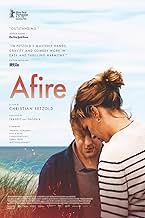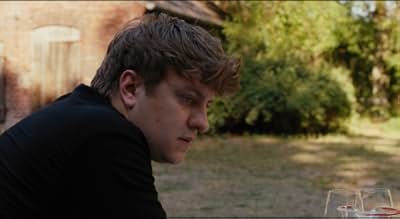CALIFICACIÓN DE IMDb
7.1/10
10 k
TU CALIFICACIÓN
Un grupo de amigos se encuentra en una casa de vacaciones junto al mar Báltico, donde las emociones se desatan al incendiarse el reseco bosque que los rodea.Un grupo de amigos se encuentra en una casa de vacaciones junto al mar Báltico, donde las emociones se desatan al incendiarse el reseco bosque que los rodea.Un grupo de amigos se encuentra en una casa de vacaciones junto al mar Báltico, donde las emociones se desatan al incendiarse el reseco bosque que los rodea.
- Premios
- 10 premios ganados y 28 nominaciones en total
- Dirección
- Guionista
- Todo el elenco y el equipo
- Producción, taquilla y más en IMDbPro
Opiniones destacadas
It's fair to say, there's no inferno or great blaze, and there's a good chance half way through, your eyes might start to glaze, the meandering's quite slow, although there is a subtle glow, but it struggles to compete with perpetual malaise. The perspective needs your mind to persevere, for reflections to emerge and re-adhere, consider landscapes past and present, how they change, evolve and ferment, locking horns with dread, anxiety and fears. The performances are fine, there is intent, although poor Leon is in permanent descent, lacks a flicker and a spark, you wouldn't say he is a lark, one of those people you might call, quite malcontent.
In interviews director Christian Petzold gave in connection with the release of "Roter Himmel" he said that he was inspired by French summer / coming of age films from for example Eric Rohmer. According to Petzold this type of film had disappeared out of German cinema since "Menschen am Sonntag" (1930, Robert Siodmak, Edgar Ulmer and Rochus Gliese). "Roter Himmel" is indeed situated during summer, but that is where any comparison ends. The beginning of "Roter Himmel" is much more a parody on the American style coming of age films such as "The cabin in the woods" (2011, Drew Goddard) with a car breaking down in the woods and creepy animal noices thereafter.
"Barbara" (2012, Christian Petzold) was still an explicit political movie about living in the DDR. Since then the films of Petzold have remained socially concerned but have become more abstract. In "Undine" (2020) a water nymph symbolizes the element of water. In "Roter Himmel" forest fires sumbolizes the element of fire. It looks like Petzold has begun a series about the elements, just like Krzysztof Kieslowski made a series about the ideals of the French revolution in the 90's. We are looking forward to the next film.
Forst fires are unfortunately very actual in the summer of 2023. However these fires are not the main theme of the film. "Roter Himmel" is not an eco-drama. They remain on the background, at least that is what we and the characters in the film belief for (too) long.
The main character of the film is Leon (Thomas Schubert), a writer writing his second book and desperately trying to match the success of his first novel. He wraps his uncertainty in a cloak of arrogance and self esteem and in so doing gets estranged from the people around him. These people are for him more an obstacle for working undisturbed than a source of inspiration. When they go for a swim he always says that his work doesn't allow him to join them, only to waste his time when they are gone.
An important moment in the film comes when the publisher of Leon meets him to discuss the progress of his work. He doesn't like the manuscript, but he is very interested in what the people around Leon are doing. Will Leon's eyes finally open?
"Barbara" (2012, Christian Petzold) was still an explicit political movie about living in the DDR. Since then the films of Petzold have remained socially concerned but have become more abstract. In "Undine" (2020) a water nymph symbolizes the element of water. In "Roter Himmel" forest fires sumbolizes the element of fire. It looks like Petzold has begun a series about the elements, just like Krzysztof Kieslowski made a series about the ideals of the French revolution in the 90's. We are looking forward to the next film.
Forst fires are unfortunately very actual in the summer of 2023. However these fires are not the main theme of the film. "Roter Himmel" is not an eco-drama. They remain on the background, at least that is what we and the characters in the film belief for (too) long.
The main character of the film is Leon (Thomas Schubert), a writer writing his second book and desperately trying to match the success of his first novel. He wraps his uncertainty in a cloak of arrogance and self esteem and in so doing gets estranged from the people around him. These people are for him more an obstacle for working undisturbed than a source of inspiration. When they go for a swim he always says that his work doesn't allow him to join them, only to waste his time when they are gone.
An important moment in the film comes when the publisher of Leon meets him to discuss the progress of his work. He doesn't like the manuscript, but he is very interested in what the people around Leon are doing. Will Leon's eyes finally open?
The plot is very disorienting. There is a huge deadly forest fire and yet mere minutes away these people are going about their recreational and artistic pursuits without issue. The fire keeps pendulating between being the driving force of the plot and being an ignored inconvenience.
The characters are all mildly uncanny. If there is an artistic message in their personae then it must have been too esoteric for me to pick up while watching.
The storyline felt like it may have been a symbol for the ideation of the film. Keep writing literary nonsense while being an unlikeable detached egotist until you finally chance upon something passable... Unfortunately, the protagonist is so egotistical that when he tries self reflection he actually somehow becomes more egotistical! So I have to confess bewilderment at what the message is supposed to be.
The characters are all mildly uncanny. If there is an artistic message in their personae then it must have been too esoteric for me to pick up while watching.
The storyline felt like it may have been a symbol for the ideation of the film. Keep writing literary nonsense while being an unlikeable detached egotist until you finally chance upon something passable... Unfortunately, the protagonist is so egotistical that when he tries self reflection he actually somehow becomes more egotistical! So I have to confess bewilderment at what the message is supposed to be.
This is an absolute gem of a film. I hadn't done my homework - just ticked it a as good option to see in the NZ International Film Festival, but I was hooked form the opening scenes. It's a subtle, beautifully played film, based around a young writer (Leon) who is struggling to put the finishing touches to a novel, while staying at what is turning out to be the holiday home from hell. Leon is his own worst enemy, always makes the wrong choice, and then beats himself up about it. There is a sinister backdrop to the story, and an unsettling tonal shift toward the end - but that's life, right? Despite the dark undercurrent that gradually emerges, the film is also very funny, and therefore works on more than one level - as a study of human behaviour but also as pure entertainment. I loved this film, and I highly recommend it.
The actor Thomas Schubert deserves much of the credit for making "Afire" work as well as it does.
He plays a self-absorbed, petty, insecure writer who's so myopically obsessed with the book he's writing that he's oblivious to the world around him. In other hands, it would be a big ask of the audience to spend two hours with such a tiring character, especially since he's in virtually every scene of the movie. But Schubert is able to make this character not only tolerable, but relatable. We're all guilty of missing the bigger picture because of our individual preoccupations.
The ending of "Afire" feels a bit overly dramatic. It's like something that would feel right at home in one of those Southern gothic plays by Tennessee Williams or Eugene O'Neill. But I did enjoy the irony of its conclusion -- once our main character starts paying attention to the trauma around him, it's something he uses to write better books.
Grade: A.
He plays a self-absorbed, petty, insecure writer who's so myopically obsessed with the book he's writing that he's oblivious to the world around him. In other hands, it would be a big ask of the audience to spend two hours with such a tiring character, especially since he's in virtually every scene of the movie. But Schubert is able to make this character not only tolerable, but relatable. We're all guilty of missing the bigger picture because of our individual preoccupations.
The ending of "Afire" feels a bit overly dramatic. It's like something that would feel right at home in one of those Southern gothic plays by Tennessee Williams or Eugene O'Neill. But I did enjoy the irony of its conclusion -- once our main character starts paying attention to the trauma around him, it's something he uses to write better books.
Grade: A.
¿Sabías que…?
- TriviaChristian Petzold binged the films of Éric Rohmer while developing this project.
- ConexionesReferenced in Film Junk Podcast: Episode 929: Perfect Days + I.S.S. (2024)
- Bandas sonorasIn My Mind
Performed by Wallners
Selecciones populares
Inicia sesión para calificar y agrega a la lista de videos para obtener recomendaciones personalizadas
- How long is Afire?Con tecnología de Alexa
Detalles
Taquilla
- Total en EE. UU. y Canadá
- USD 244,803
- Fin de semana de estreno en EE. UU. y Canadá
- USD 38,485
- 16 jul 2023
- Total a nivel mundial
- USD 2,295,497
- Tiempo de ejecución
- 1h 42min(102 min)
- Color
- Relación de aspecto
- 1.85 : 1
Contribuir a esta página
Sugiere una edición o agrega el contenido que falta


























